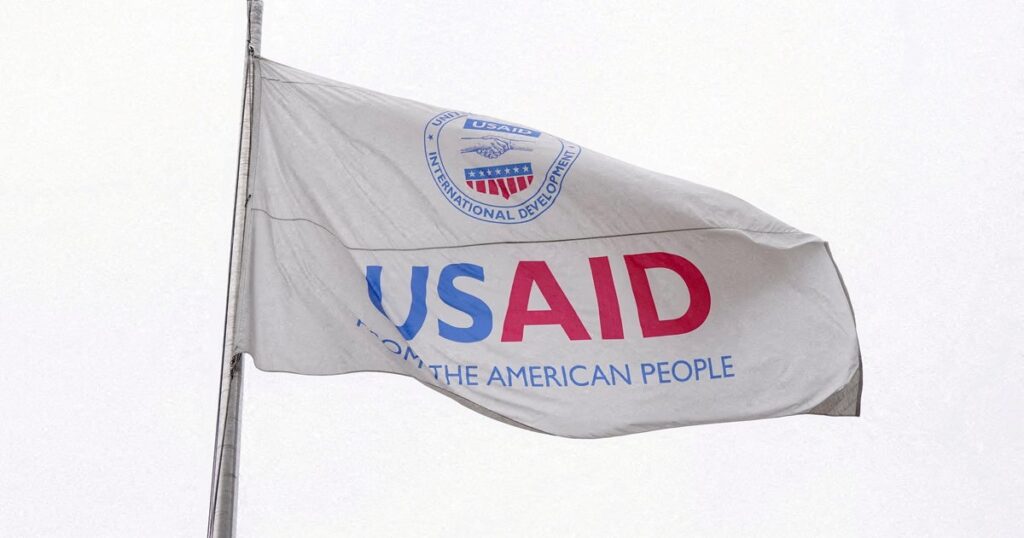
Lindsay Brown was working from home in Little Rock, Arkansas, when, during a company meeting in February, her employer said that due to the United States Agency for International Development not making payments to the organization, staff changes needed to happen.
Brown, who worked in internal communications for the nonprofit FHI 360, has been furloughed since shortly after that meeting.
She learned that her last day at FHI 360 will be May 2.
She is one of the close to 20,000 employees — many living in states such as North Carolina, Vermont, California and Georgia — who lost their jobs as the Trump administration took steps to shutter USAID.
Secretary of State Marco Rubio, who has authority over the agency, said on Tuesday that the government plans to make staffing cuts, eliminating every position at the agency not required by law, and consolidate domestic offices at the State Department. The impending cuts are most likely to be felt by workers outside of Washington, D.C., already reeling from the decimation of their livelihoods and fields.
USAID provided federal funding to hundreds of companies, organizations and universities to help run programs and research dedicated to various aspects of foreign aid. These companies employed people around the country, many of whom have already been furloughed, and are now finding out their positions have been eliminated.
USAIDstopwork, a website tracking the economic impact of the USAID funding cuts, determined that 19,187 American jobs have been lost as of Wednesday. The tracker found a total of 46 states were affected by job cuts and that, outside of Maryland and Virginia, some of the most impacted states were North Carolina, New York, Vermont, Massachusetts and California. In Georgia, for example, USAID funded 18 organizations that ran 79 programs, and 44 of those programs were shuttered, leading to layoffs and an estimated loss of $257.9 million.
For workers living in states outside the beltway, job loss can be particularly isolating.
“I have used all my savings during this furlough while FHI 360 fights to get the government to pay what it is owed. Being in Arkansas and getting resources like unemployment has been very difficult,” Brown told CBS News. She said the organization has communicated with staff about the impending cuts, but it didn’t make the layoffs any easier.
CEO Tessie San Martin posted on LinkedIn last week that the company terminated 480 U.S. employees, including 140 in North Carolina, where it’s headquartered.
“FHI 360 is not alone in experiencing this type of impact,” San Martin wrote. “Foreign service nationals, USAID staff, colleagues in our sector, and technical experts worldwide are all part of what has been an important sector in the U.S. economy.”
Wayan Vota was working from Chapel Hill, North Carolina, for the international development organization Humentum when he was laid off in February. He said employees were stunned as companies laid off people left and right.
“Layoff trauma hit across the country,” said Vota, adding the pain of USAID cuts extend beyond federal workers living in Washington D.C., Maryland and Virginia. He pointed to his newsletter Career Pivot, which he started in the aftermath of the mass cuts in February as a way to help fellow contractors and federal workers who were affected by the USAID cuts. It’s already grown to an audience of more than 12,000 subscribers as more federal agencies face staffing and budget cuts, he told CBS News.
He anticipates the crisis will get worse when the remaining USAID workers who are still receiving their salaries stop getting paid. The vast majority of USAID employees will lose their jobs on either July 1 or Sept. 2, according to a memorandum to staff obtained by CBS News.
Vota said several job seekers living outside the Washington, D.C., corridor are searching for work in the private sector or state government. Others are exiting the formal job market, he said, because the type of work they did is limited in the state where they live. Vota said job seekers tell him, “I don’t see anything I can or want to do in the formal job market, so I am going to take any job, driving Ubers, waiting tables, cause my dream is dead and I’m not sure what I’m going to do next.”
Kasia Hatcher, 45, moved from Virginia to Georgia after her position at EnCompass was terminated and was eventually shut down due to funding loss.
Hatcher, who has worked in international development for 20 years, said watching all the job losses was heartbreaking and “all was gone in what seemed like overnight.”
She said she spent 20 years building up experience where people knew her work and the quality of her work – and it was daunting to have to build again. She’s been searching for work in human resources in the Atlanta area and said she remains hopeful she’ll find something soon.
“I can offer so much,” she said.





